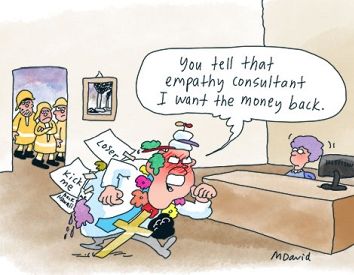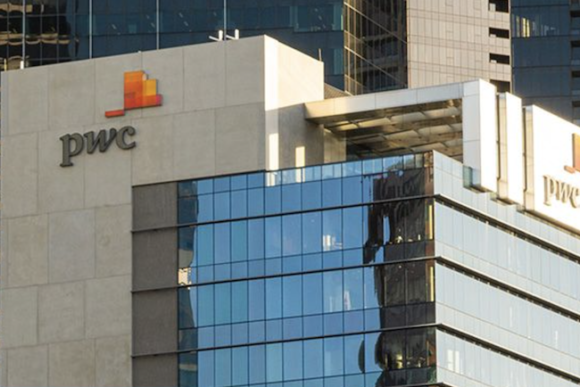A former chair of the Tax Practitioners Board, who worked at a firm that became PwC, has left the role and thus raising serious questions, reports Anthony Klan.
THE LONG-TIME chair of the Tax Practitioners Board (TPG), who departed immediately before explosive Senate hearings into the PwC tax scandal two weeks ago, spent almost a decade working for the same accountancy as disgraced tax practitioner Peter Collins.
The Klaxon can reveal Ian Klug, who as TPB chair oversaw the three-year investigation into former PwC tax partner Collins, spent nine years working for Coopers & Lybrand, now PwC, but failed to disclose the ties.
Klug’s past as a senior tax specialist with Coopers & Lybrand does not appear in Klug’s bio in the Tax Board’s annual reports; did not appear in his bio on the Tax Board’s website; and does not appear on his extensive LinkedIn resume.
Klug also did not disclose it to the Senate Economics Committee, after ALP Senator Deborah O’Neill asked about Tax Practitioner Board links in February.
That’s despite Klug having worked for just two accountancy firms for his entire accounting career — Coopers & Lybrand (now PwC) and Pitcher Partners.
In January Klug announced former PwC tax partner Peter Collins had been banned for two years for leaking confidential Federal Government plans to combat multinational tax evasion.

Treasury had engaged Collins starting in 2014 to assist in drafting new laws, but despite confidentiality agreements Collins shared the secret information widely within PwC, which then sold it to multinationals seeking to avoid Australian tax.
Following February’s Senate hearing, Klug’s TPB responded in writing to questions taken on notice.
‘Importantly, Ms Sullivan and Mr Hogan have made declarations of interest to the TPB about their connection to PwC,’ the TPB wrote.
Further, to address any actual or perceived conflicts of interest, Ms Sullivan and Mr Hogan recused themselves and did not sit on the relevant BCC that considered the Peter-John Collins and PwC matters and were not involved in any other relevant matters, decisions and discussions related to Peter John Collins and PwC, including discussions at Board meetings.
On Friday 26 May, days before the Tax Practitioner Board last week fronted the Senate inquiry into consulting services, it was announced Klug had been replaced as chair — after 4.25 years in the role.
His replacement as chair, Peter de Cure, who had been in the role just 48 hours, fronted the Senate inquiry last Wednesday and was asked about PwC links at the TPB and whether former PwC employees had been involved in the Collins and PwC matter.
The Tax Practitioners Board gave Collins a two-year ban, short of the maximum five years.
Despite having “breached its obligations under the law” PwC was not penalised, instead being required to have “training in place” to “ensure conflicts of interest are adequately managed”.
Last week O’Neill asked de Cure whether “the reason you didn’t suspend PwC” was related to there being TPB members with links to PwC.
“No. The two board members who were partners of PwC, they were excluded from all discussions in relations to this matter,” de Cure responded.
“They left the room whenever this matter came up, they did not participate in any way, shape or form, in the board conduct committees work, so there was no ability for them to influence these decisions.”
Yet Klug, who announced the Collins and PwC findings, was chair throughout.
In the January 23 statement, Klug says:
‘We are very concerned when tax practitioners abuse their positions of trust, or fail to act with integrity.’
‘Leaking confidential information in these circumstances might be seen to elevate personal and commercial profit, breaching public interest, legal and ethical obligations,’ says Klug, who is the only person quoted in the statement.
Klug and the TPG have for the past week repeatedly refused to comment when asked about Klug’s past and whether he worked at Coopers & Lybrand.
Yet his nine-year career at the firm, where he was a senior tax specialist, including in an overseas posting, feature in an obscure podcast interview Klug gave in 2017.

“I was fortunate enough to get a job with what was then Coopers and Lybrand, which became… PwC,” Klug says.
“I started with them and in a sense the rest is history. I spent nine years then with Coopers and Lybrand, two of which I spent in the UK, working in the London office, which was a fabulous experience.”
“I specialised in taxation,” Klug says.
Klug says he was then offered a job at law firm Douglas Heck & Burrell, which later became Pitcher Partners.
“I had really only worked in two different firms, the former Coopers and Lybrand and at Douglas Heck & Burrell, which then morphed into Pitcher Partners,” Klug says.
Regarding his career at the two firms, Klug states:
“I’d done a whole range of different things, worked overseas, gone from one division to another, moved from being a specialist tax partner to being a broader business services partner, albeit with a strong tax base.”
Klug’s LinkedIn bio states he started at what is now Pitcher Partners in 1990 (no month is given) and remained there as tax partner until 2008.
Searches show there a string of current PwC partners who worked at Coopers & Lybrand at the same time as Klug.
PwC partners, both current and former, are likely to be personally impacted by the scandal as PwC attracts fewer contracts, especially from the federal government.
In 2020 PwC disclosed that it paid eligible former partners an average of $140,000 a year under its retirement plan, with the size of those payments determined by the firm’s profits.
It appears Klug and Collins may have worked at the same firm within months of each other, at the very least.
Collin’s LinkedIn bio states he started at “PwC” in January 1990.
PriceWaterhouseCoopers (which was later changed to “PwC”) was created in 1998 when Coopers & Lybrand merged with Price Waterhouse.
Former PwC Australia CEO Luke Sayers also appears to have been at the firm at around the same time.
Sayers’ LinkedIn profile states he started at “PwC” in June 1991.
Sayers became PwC Australia’s head of tax, before becoming CEO in 2012. He was PwC CEO from 2012-2020 and so in charge at all relevant times of the tax leaks affair.
Sayers has repeatedly refused to comment when contacted by The Klaxon.
After leaving PwC in mid-2020 Sayers set up a consultancy called Sayers Group, which like PwC specialised in “consultancy” work provided to government.
As previously revealed by The Klaxon, in just the last 24 months the federal government has given Sayers group contracts worth more than $6.2 million.
In his 2017 podcast interview, Klug says that at “around 50” he left Pitcher Partners to become professional board member.
He is currently chair of the Museum of Brisbane, engineering company Place Design Group and infrastructure company The Water and Carbon Group.

Klug did not respond to written questions The Klaxon put to him via each of those companies last week.
As TPB chair, a part-tine role, Klug was paid a taxpayer-funded salary of $144,000 a year.
He is also a director of Queensland Ballet and Trickling Filters Australia, a wastewater treatment company.
The Tax Practitioners Board and de Cure have also refused to comment over the past week, including when asked whether Klug had recused himself from the TPB’s dealings with Collins and PwC.
‘The TPB are not making any further public comments on the PwC matter,’ TPB communications manager Julie Shaw said in a written statement.
Klug was appointed a director of the Tax Practitioners Board in December 2015, his bio states.
In February 2019 he was appointed chair, for a three-year term, by then Treasurer Josh Frydenberg.
In February 2021 it was announced Klug’s term as chair had been extended.
Three weeks ago, on the evening of May 17, without any explanation or statement by the TPB, Klug’s named was removed from the TPB’s website.
He was replaced by Peter de Cure, a former tax partner at “big four” consultancy KPMG, who was listed as ‘acting chair’.
De Cure had been on the TPG board since 2017.
The change was not announced until two weeks later, on May 26, three business days before the TPB was due to front the senate inquiry, when Financial Services Minister and Assistant Treasurer issued a statement.
Klug is mentioned just once in — in the statement’s final sentence.
Corporate governance expert Dr Andy Schmulow, an Associate Professor in law at the University of Wollongong, said he discovered the change at the TPB while researching for a paper on the PwC scandal.
‘On May 17 he was there as chair. The next morning his name was gone, there was no statement, nothing,’ Schmulow told The Klaxon.
‘He just vanished.’
Anthony Klan is an investigative journalist and editor of ”The Klaxon’. You can follow him on Twitter @Anthony_Klan. This article was originally published on The Klaxon and has been republished with permission.
Related Articles
Support independent journalism Subscribe to IA.


